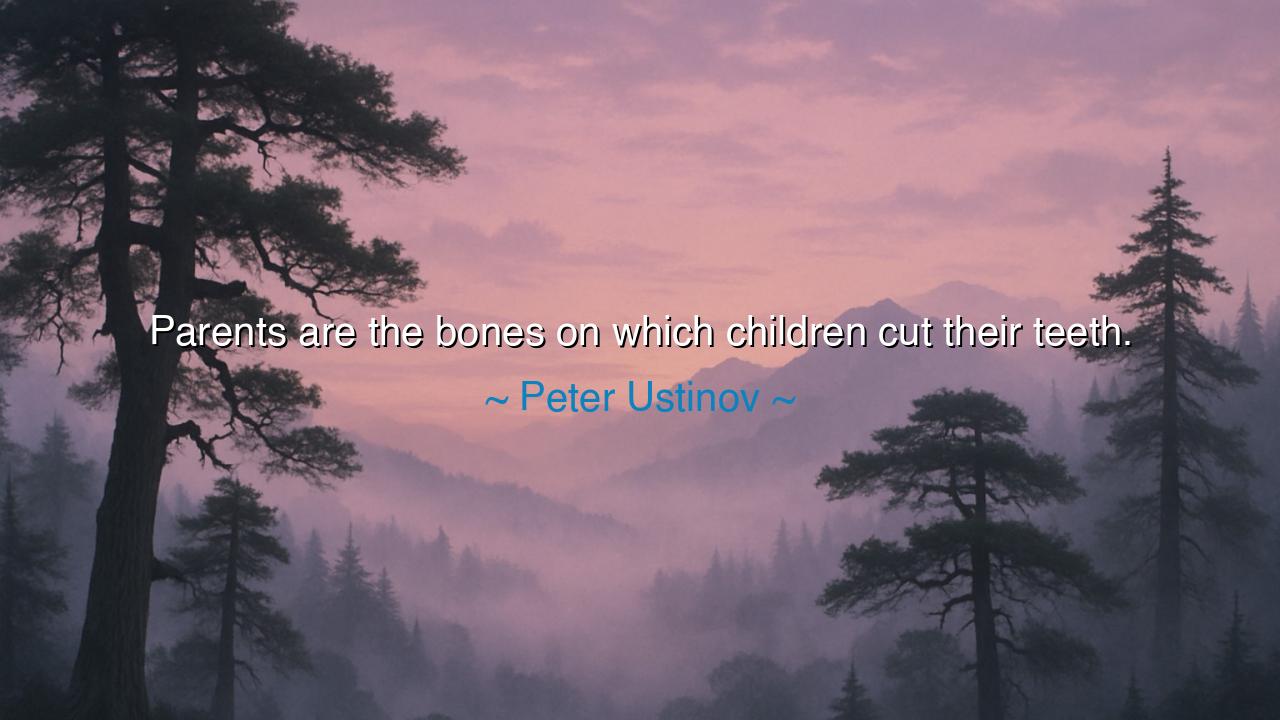
Parents are the bones on which children cut their teeth.






In the words of Peter Ustinov, there resounds a truth both sobering and profound: “Parents are the bones on which children cut their teeth.” This image is not gentle, but sharp, revealing the inevitable tension of family life. For children, in their growth, test their strength upon their parents; they learn resilience by pressing against the firmness of those who raise them. And parents, in turn, endure this pressure, becoming the steady structure against which their children sharpen their character and discover themselves.
The meaning of this quote lies in its metaphor. Just as the first teeth of an infant break through with pain, so the growth of a child into maturity often comes with struggle. The bones of the parents—symbols of endurance, strength, and stability—provide the resistance against which children learn the hardness of life. It is through testing limits, questioning authority, and even clashing with their parents that children prepare themselves for the world beyond the household. Thus, the role of the parent is not only to nourish and protect, but also to withstand the friction of a child’s growth.
History is filled with such examples. Consider King Henry IV of France and his son, the future Louis XIII. The father, wise and pragmatic, clashed often with the young heir, whose impatience and pride were sharpened by their quarrels. These struggles were not meaningless; they forged in the son a strength that prepared him for rule. Or think of Socrates, who referred to himself as a gadfly, stinging his pupils into awareness. In the same way, parents become the first firm wall against which a child learns to push, to question, to rebel, and finally to stand.
There is also a note of sacrifice within Ustinov’s words. The bones endure the wear, even the ache, of being pressed against. Parents are not spared the cost of raising children; they feel the sting of criticism, the pain of rebellion, the sorrow of watching their children grow apart before growing close again. Yet this sacrifice is not in vain—it is the very substance of parenting. The parent must be strong enough to be tested, willing enough to endure pain, and wise enough to know that this struggle is the necessary labor of love.
We see this reflected in the story of Thomas More, who raised his children in faith and discipline, often requiring them to challenge ideas and think deeply. His daughter Margaret, in particular, became renowned for her intellect and moral courage, qualities sharpened upon the strength and convictions of her father. Though she did not always agree with him, her greatness was born from pressing against the firm shape of his beliefs. So it is with all children: greatness is not formed in ease, but in the presence of resistance.
The lesson here is clear: do not fear the tension between parent and child, for it is part of the sacred process of growth. To be a parent is to provide both comfort and challenge, both tenderness and resistance. And to be a child is to press against boundaries, not out of hatred, but out of the natural desire to grow into strength. The clashing, the friction, the testing—all of these are the chisel that shapes character.
Practical wisdom follows. Parents, accept that your role is not always to be adored but to be steadfast. Be firm in your values, even when they are resisted, for it is this firmness that will give your children something to press against as they find themselves. And children, honor the resistance of your parents, for in testing them, you are learning your own strength. What may feel like conflict now is often the hidden gift of preparation.
Thus, in the vivid imagery of Peter Ustinov, we are reminded that parenting is not only the soft embrace, but the hard bone—the unyielding strength against which the next generation sharpens its teeth. It is a painful, necessary, and beautiful process, through which both parent and child are shaped. Let us then honor the struggle, for within it lies the making of resilience, wisdom, and love that endures.






AAdministratorAdministrator
Welcome, honored guests. Please leave a comment, we will respond soon